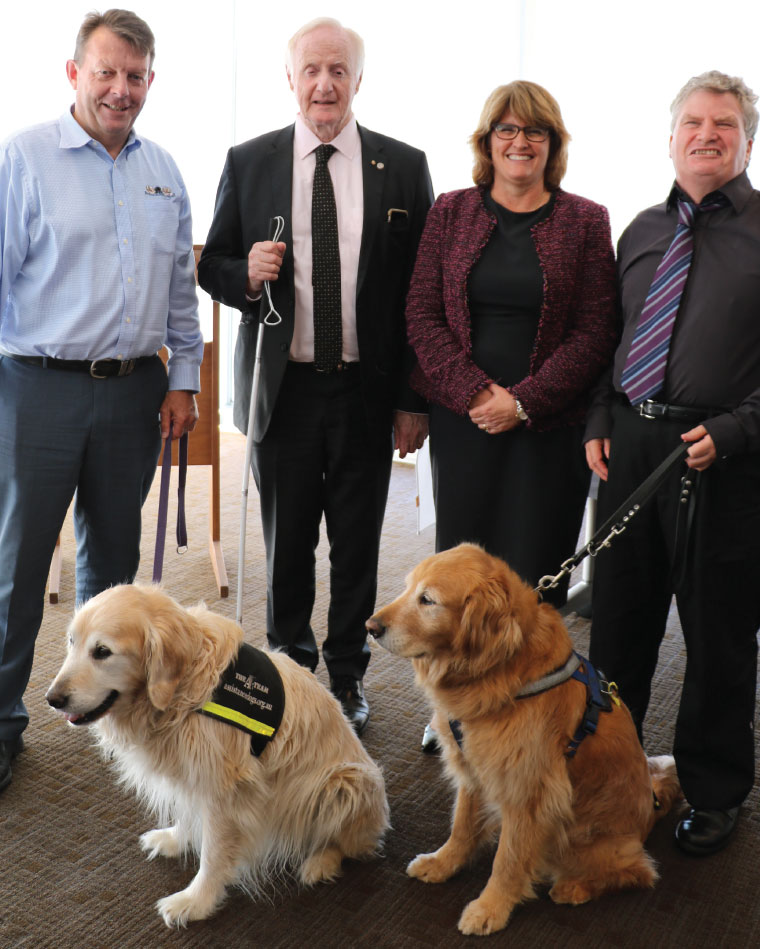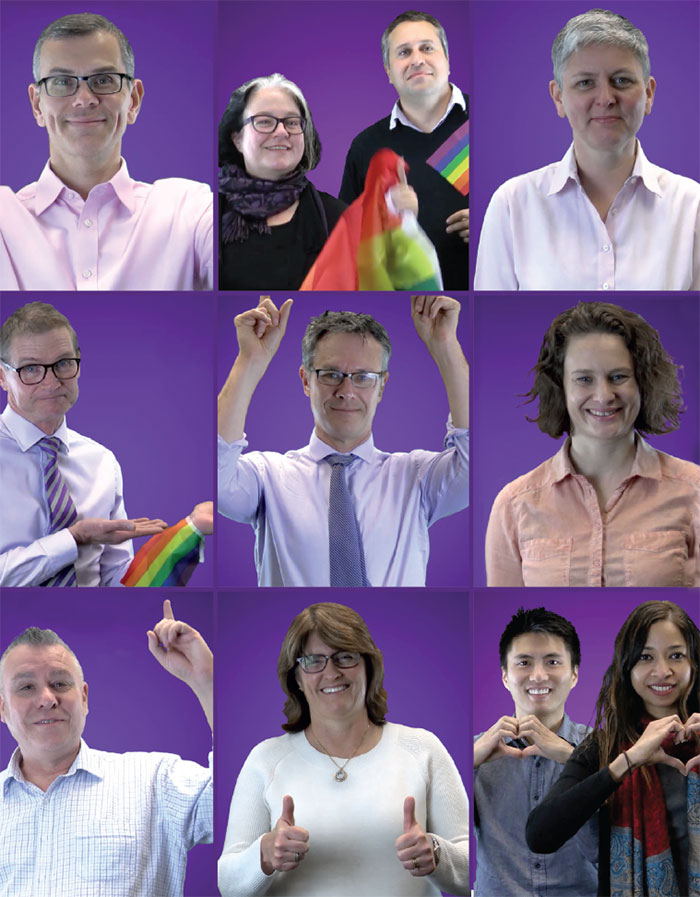Equity & Diversity Annual Report – 2018 Introduction
This is the 31st Equity & Diversity Report of the Reserve Bank of Australia (the Bank), covering the reporting period of 1 July 2017 to 30 June 2018.
Our Approach to Diversity
A focus on diversity is essential for the Bank to realise the value of the diverse thinking, experience and perspectives our people bring to the workplace. We aim to create a workplace in which all employees feel valued and included, enabling them to contribute fully to our success. Our value of Respect underpins our approach to Diversity and Inclusion. This report provides an annual review of our workforce diversity profile and the take-up of diversity program initiatives in the past year.
Statement of Commitment
The Diversity and Inclusion Statement of Commitment outlines the Bank's commitment to:
- providing equal employment opportunities for all current and prospective employees based on their ability and performance
- fostering the inclusion of women, various age groups, people with disabilities, people of diverse cultural backgrounds, Indigenous Australians and LGBTI (lesbian, gay, bisexual, transgender and intersex) employees within our workplace
- developing a deep and diverse pool of well-trained potential leaders in order to increase the diversity of people who hold management positions. The Bank has a gender diversity target for 35 per cent of management roles to be held by women by 2020 and 50 per cent in the longer term
- promoting an inclusive and collaborative culture by ensuring employees are treated fairly and equitably in line with the Bank's values
- equitably enacting and applying the Bank's policies, including those in relation to workplace conduct, leave, flexible work arrangements, grievances, performance management, remuneration, recruitment and selection.
Roles and Responsibilities
To create a fully inclusive workplace, we encourage a culture of diversity, engagement and flexibility, and support and promote inclusive actions and behaviours. To help achieve this, we provide clear expectations on behaviour and completion of learning modules and encourage participation in diversity-based activities. We encourage employees to speak up if they experience, or are aware of, any practices or behaviours that do not promote inclusion.
Executive Committee
The Bank's Executive Committee is the key governing body responsible for the strategic direction of the Bank's equity, diversity and inclusion practices.

Diversity and Inclusion Council
The Diversity and Inclusion Council (the Council) is chaired by the Deputy Governor and comprises sponsors and chairs of the six Employee Resource Groups (ERGs) and the Head of Human Resources. The Council meets quarterly and makes recommendations on equity, diversity and inclusion matters to the Executive Committee and the Governor. The Council also monitors and evaluates Diversity and Inclusion initiatives implemented across the Bank.
Employee Resource Groups
Established in 2016, our ERGs contribute to creating an inclusive culture by informing and developing policy, raising awareness of issues and supporting relevant activities both inside and outside the Bank.
Each ERG is led by an Executive Sponsor and Chair and consists of 15 to 30 active members; membership is entirely voluntary. There are six ERGs, each is responsible for a specific aspect of diversity and inclusion, namely:
- Accessibility
- Flexibility
- Gender Equity
- Indigenous Australians
- LGBTI+ Allies
- Race and Cultural Identity
While ERGs work independently of one another, groups will collaborate on initiatives that intersect across two or more groups to ensure the highest level of involvement by the Bank's employees.
Executive management
Executive managers, including those who are Deputy Heads of Departments and above, are responsible for promoting the Bank's policies and values and the implementation of diversity and inclusion initiatives within their areas. This includes activities such as recruitment and selection processes, performance assessments, development opportunities, remuneration outcomes, flexible work requests and leave applications.
Managers and supervisors
Managers and supervisors are responsible for taking active measures to promote diversity and inclusion in their work areas as well as taking steps to prevent discrimination, harassment and exclusion from occurring. Managers and supervisors are expected to have a comprehensive understanding of policies and processes relating to diversity and inclusion, and promptly and effectively deal with any issues.
Leadership development programs implemented in the reporting period have included components on diversity and establishing a psychologically safe work environment.
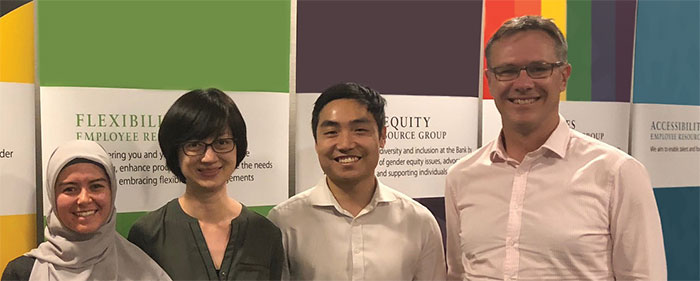
All employees
All employees are required to ensure their actions in the workplace are consistent with the Bank's values and principles for diversity and inclusion and are encouraged to speak up if they witness or experience behaviours that contravene our policies, or practices which may exclude others.
From time to time, all employees are required to undertake training relating to diversity and inclusion and must be well informed about the Bank's diversity and inclusion policies and related legislation. Employees are encouraged to participate in initiatives and activities organised by ERGs to recognise and celebrate aspects of diversity at the Bank. In the past year these included celebrations such as International Women's Day, National Reconciliation Week, IDAHOT and Diwali.
Strategy and Policy Initiatives
The Bank's People and Culture Strategy includes a focus on developing a deep and diverse pool of well-trained employees, and fostering an inclusive and flexible work environment.
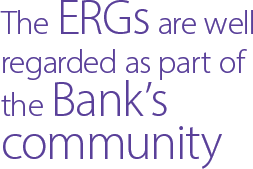
The implementation of the ERGs has been instrumental in increasing diversity and inclusion in the Bank's culture. The efforts of the Indigenous Australians ERG resulted in the launch of our Reconciliation Action Plan (RAP) and the permanent placement of the Aboriginal flag on all RBA buildings. The ERGs have been instrumental in developing and promoting policies relating to Accessibility and Flexibility issues and processes. These initiatives have been achieved through internal and external consultation, research and focus groups, review of best practice across public and private sector organisations and enhanced by the diligence and commitment of the ERG members. The ERGs are well regarded as part of the Bank's community and awareness of their role and activities is high.
The 2017 Employee Engagement Survey provided an opportunity to analyse employee engagement across key demographics, including age, sex, tenure and cultural identity. The survey also provided insight into the engagement of employees accessing flexible work arrangements. For example, employees who reported working from home on a formal or ad hoc basis rated a higher level of engagement than the overall rating. Engagement ratings across both sexes were very similar, with males rating slightly higher than females. Diversity continues to be seen as a key strength of the Bank.
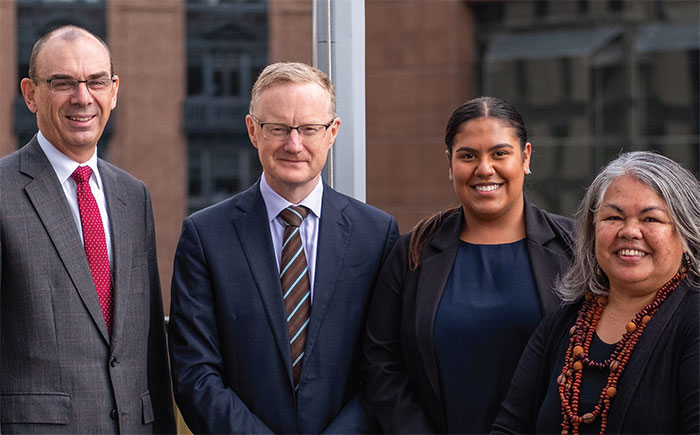
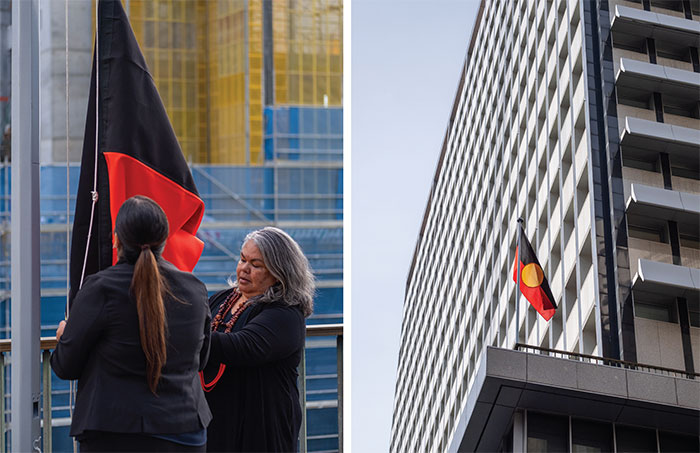

A focus on the recruitment of women in leadership roles has resulted in the implementation of the MOVE Careers Program, tailoring flexibility to meet the needs of appropriately skilled candidates and support them with an individualised 12-month development plan.
Training and Awareness
The Bank actively promotes diversity through its leadership development programs for managerial staff. These programs include unconscious bias and inclusive leadership modules. They support expected workplace behaviours and assist managers in embedding the Bank's values.
During the reporting period, the Bank provided training to all staff on their workplace responsibilities related to equity, diversity and conduct. All employees completed training on the Code of Conduct and the Workplace Behaviours Policy, which covered the Bank's values, expected workplace behaviours, roles and responsibilities, anti-discrimination legislation and the Bank's Diversity & Inclusion Program.
Activities and programs organised by ERGs are aimed at raising awareness of issues relating to various aspects of diversity and fostering a sense of inclusion across all employees. Activities during the reporting period include a range of social activities, panel discussions that have included internal and external experts, cultural awareness training, bias awareness training and manager training for flexible work requests.
Creating Opportunities
In 2017/18, the Bank has again partnered with CareerTrackers Indigenous Internship Program to source and place four Indigenous interns for 12 weeks during summer and winter vacation periods. One of the 2017 interns has been offered a place on the Graduate Program upon completion of studies.
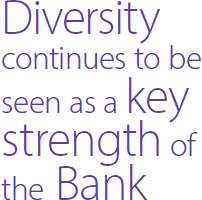
The Bank's Business Administration Traineeship Program has been reviewed and now focuses on providing 12-month traineeships to Indigenous school leavers, providing them with paid employment. Trainees also complete a Certificate III in Business Administration through a registered training organisation and are paid while attending classes. Three Indigenous trainees are currently participating in the program.
The Bank also engaged two interns through the Australian Network on Disability through their Stepping Into program. This program provides internships to university students with disability.
External Memberships
The Bank keeps up to date on external equity, diversity and inclusion practices through memberships to ensure its Diversity and Inclusion Program remains current. These memberships provide access to information, consultation and guidance in our approaches to specific issues and initiatives.
During the reporting period, the Bank renewed its membership in Pride in Diversity (PiD), a not-for-profit employer support program on LGBTI workplace inclusion, and Diversity Council Australia, a not-for-profit diversity adviser to businesses in Australia. The Bank also renewed its Silver membership with the Australian Network on Disability, a not-for-profit organisation that aims to advance the inclusion of people with disability in all aspects of employment, and the NSW Equal Employment Opportunity Practitioners' Association. The Bank was also re-accredited as a Breastfeeding Friendly Workplace by the Australian Breastfeeding Association.
The Bank has also renewed membership of the Australian Mathematical Sciences Institute to help improve the representation of women in Science, Technology, Engineering and Mathematics (STEM) disciplines.
Data Collection
Equity and diversity information is sought from employees when they commence employment at the Bank and as part of a periodic profile update. It is provided on a voluntary basis, and includes information on disability, indigeneity, ethnic origin and proficiency in languages other than English. The Bank's equity and diversity statistics are based primarily on these data.
For potential employees of the Bank, the job application form contains an equity and diversity questionnaire, which provides the Bank with a better understanding of the applicants from a diversity perspective and facilitates any reasonable adjustments that might be required, both during the recruitment process and in subsequent employment.
Each ERG has nominated a Diversity Data representative to analyse relevant data from internal and external sources to help inform policy and initiatives to best meet the needs of the Bank employees.
